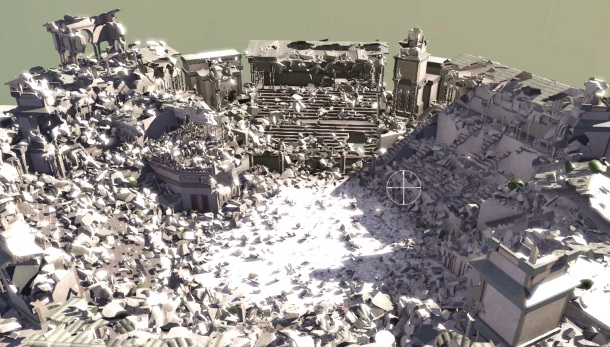GDC 2013: Nvidia tech demo shows massive real-time destruction

If this was a movie, the end of this video would pull back to reveal a round-table of world leaders staring dumbfounded. Then, Nvidia's PhysX SDK Research Lead Matthias Müller-Fischer, would appear on their screen (possibly with a cat), point his omnipotent crosshair of ultimate destruction at Big Ben and start reading out the transfer details for his Swiss bank account.
Instead, it's a clever GDC tech demo experimenting with real-time dynamic fracturing. As yet, it's not a perfect physics simulation - those structures aren't collapsing under their own weight. That's something Müller-Fischer says should be working soon.
The demo's running at 30 frames per second on a single GTX 680 - which is a somewhat moderate speed for what is still a pricey card. That means we're likely a way off seeing this sort of wanton destruction make its way into a working game. But it's a nonetheless cool look at the future of blowing up buildings.
Thanks, VG247 .
The biggest gaming news, reviews and hardware deals
Keep up to date with the most important stories and the best deals, as picked by the PC Gamer team.

Phil has been writing for PC Gamer for nearly a decade, starting out as a freelance writer covering everything from free games to MMOs. He eventually joined full-time as a news writer, before moving to the magazine to review immersive sims, RPGs and Hitman games. Now he leads PC Gamer's UK team, but still sometimes finds the time to write about his ongoing obsessions with Destiny 2, GTA Online and Apex Legends. When he's not levelling up battle passes, he's checking out the latest tactics game or dipping back into Guild Wars 2. He's largely responsible for the whole Tub Geralt thing, but still isn't sorry.

Nvidia's upgrading GeForce Now's $10 tier with 1440p and Ultrawide resolutions, but the only extra Ultimate users get is a new 100-hour play limit

Intel CEO sees 'less need for discrete graphics' and now we're really worried about its upcoming Battlemage gaming GPU and the rest of Intel's graphics roadmap
Most Popular







